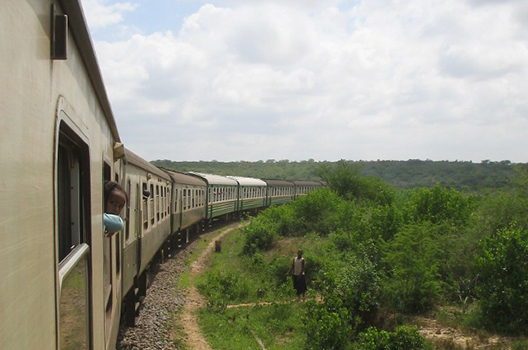 On May 11 China’s Prime Minister Li Keqiang formally signed a deal with a number of East African leaders for the Export Import Bank of China to finance the first stage of a modern railway network that would connect the major cities of the East African Community (EAC)—Bujumbura, Juba, Kampala, Nairobi and Kigali—with the coast. The initial segment will provide a rail link between the region’s major economic hub, Nairobi, and the port city of Mombasa. These 610 kilometers of track are expected to cost $3.8 billion, 90 percent of which will be funded by the Export Import Bank and 10 percent by the Kenyan government. Construction is expected to begin in October 2014 and finish in 2017. China’s state-owned construction firm, China Communications Construction Company (CCCC), will be the principal contractor.
On May 11 China’s Prime Minister Li Keqiang formally signed a deal with a number of East African leaders for the Export Import Bank of China to finance the first stage of a modern railway network that would connect the major cities of the East African Community (EAC)—Bujumbura, Juba, Kampala, Nairobi and Kigali—with the coast. The initial segment will provide a rail link between the region’s major economic hub, Nairobi, and the port city of Mombasa. These 610 kilometers of track are expected to cost $3.8 billion, 90 percent of which will be funded by the Export Import Bank and 10 percent by the Kenyan government. Construction is expected to begin in October 2014 and finish in 2017. China’s state-owned construction firm, China Communications Construction Company (CCCC), will be the principal contractor.
The East African railway is a locally-driven initiative that comes at a very high cost – no donor other than China could afford to pay for it, and construction is entirely beyond the financial capacity of the East African states. But the EAC stands to benefit enormously from the investment.
Experts anticipate that the new railway will drastically improve market connectivity and reduce travel time. According to Kenyan President Uhuru Kenyatta, construction of the railway will lessen the cost of freight shipments from twenty US cents per metric ton (1.1023 tons) to eight cents. This will lower the cost of production in the region and will doubtless boost foreign direct investment: multinationals and international investors regard the region’s slow, unreliable infrastructure as a major deterrent. The railway is expected to boost Gross Domestic Product, and spark job creation: the CCCC estimates each kilometer of track will create sixty jobs.
Despite these benefits, a number of local critics of the deal have emerged. David Ndii, an economist and a writer for the Kenyan Daily Nation, estimates that the railway will increase Kenya’s external debt by one-third, and increase the country’s debt-to-GDP ratio by 9 percent. He believes that Kenya could have negotiated a more favorable deal (with a lower interest rate and longer pay period) through the World Bank. Kenyan officials, to the frustration of many lawmakers, have said there was no bidding process as this was a condition to lock in the Chinese financing. Officials likely opted for China’s funding knowing any deal with the World Bank would include governance ‘conditionalities’ and take years to obtain.
Both the benefits and the drawbacks are typical of Sino-African relations. China regularly frames its relationship with African countries as an equal partnership – it does not meddle in the governance practices of its partners, and for that reason has been able to position itself as an attractive alternative to Western funding—often by demonstrating solidarity with pariah African nations, such as Sudan and Zimbabwe, which some segments of the African publics and many African lawmakers feel have been unfairly targeted by Western economic sanctions.
But tough negotiation practices are also fairly standard for infrastructure transactions between China and African nations. Hard bargaining is evident in the East African railway deal: the Chinese Export Import Bank will earn a 4.4 percent interest rate on the 90 percent it pledged over a twenty year period. Moreover, the railway will drastically reduce the cost of transporting the valuable natural resources (such as oil and minerals) China desperately needs to import from Africa in order to fuel its own rapid economic growth.
The benefits that African countries gain from partnering with China clearly outweigh the costs: China is the only nation on earth that is willing and able to underwrite Africa’s profound infrastructure needs. China has explicitly framed its relationship with African states as an economic transaction between equal partners, not as charity. Nonetheless, China’s tactics have frustrated certain segments of the African public, forcing Beijing to reconsider its way of doing business over the past several years and raising the specter of a popular backlash against the growing Chinese footprint on the continent. On the other hand, as China adapts its practices and as important projects like the East African railway near completion, Africans may find themselves in a less critical frame of mind.
Image: By Rotsee2 via Wikimedia Commons
